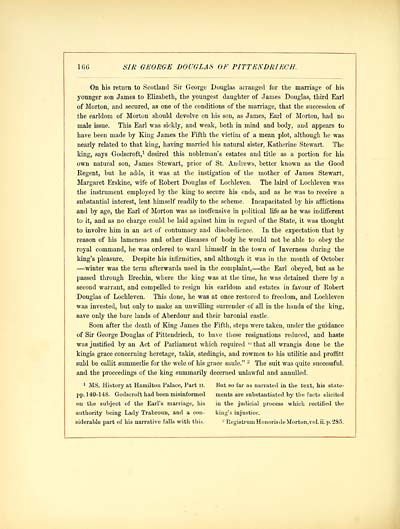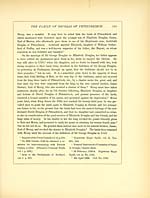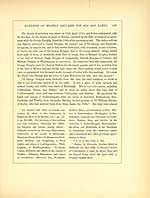Douglas book > Angus memoirs
(190) Page 166
Download files
Complete book:
Individual page:
Thumbnail gallery: Grid view | List view

16G SIR GEORGE DOUGLAS OF PITTENDRIECH.
On his return to Scotland Sir George Douglas arranged for the marriage of his
younger son James to Elizabeth, the youngest daughter of James Douglas, third Earl
of Morton, and secured, as one of the conditions of the marriage, that the succession of
the earldom of Morton should devolve on his son, as James, Earl of Morton, had no
male issue. This Earl was sickly, and weak, both in mind and body, and appears to
have been made by King James the Fifth the victim of a mean plot, although he was
nearly related to that king, having married his natural sister, Katherine Stewart. The
king, says Godscroft, 1 desired this nobleman's estates and title as a portion for his
own natural son, James Stewart, prior of St. Andrews, better known as the Good
Regent, but he adds, it was at the instigation of the mother of James Stewart,
Margaret Erskine, wife of Robert Douglas of Lochleven. The laird of Lochleven was
the instrument employed by the king to secure his ends, and as he was to receive a
substantial interest, lent himself readily to the scheme. Incapacitated by his afflictions
and by age, the Earl of Morton was as inoffensive in political life as he was indifferent
to it, and as no charge could be laid against him in regard of the State, it was thought
to involve him in an act of contumacy and disobedience. In the expectation that by
reason of his lameness and other diseases of body he would not be able to obey the
royal command, he was ordered to ward himself in the town of Inverness during the
king's pleasure. Despite his infirmities, and although it was in the month of October
— winter was the term afterwards used in the complaint, — the Earl obeyed, but as he
passed through Brechin, where the king was at the time, he was detained there by a
second warrant, and compelled to resign his earldom and estates in favour of Robert
Douglas of Lochleven. This done, he was at once restored to freedom, and Lochleven
was invested, but only to make an unwilling surrender of all in the hands of the king,
save only the bare lands of Aberdour and their baronial castle.
Soon after the death of King James the Fifth, steps were taken, under the guidance
of Sir George Douglas of Pittendriech, to have these resignations reduced, and haste
was justified by an Act of Parliament which required " that all wrangis done be the
kingis grace concerning heretage, takis, stedingis, and rowmes to his utilitie and proffitt
suld be callit summerlie for the wele of his grace saule." 2 The suit was quite successful.
and the proceedings of the king summarily decerned unlawful and annulled.
1 MS. History at Hamilton Palace, Part II. But so far as narrated in the text, his state-
pp. 140-14S. Godscroft had been misinformed ments are substantiated by the facts elicited
on the subject of the Earl's marriage, his in the judicial process which rectified the
authority being Lady Trabroun, and a con- king's injustice,
siderable part of his narrative falls with this. - Registrum Honoris de Morton, vol. ii. p. 285.
On his return to Scotland Sir George Douglas arranged for the marriage of his
younger son James to Elizabeth, the youngest daughter of James Douglas, third Earl
of Morton, and secured, as one of the conditions of the marriage, that the succession of
the earldom of Morton should devolve on his son, as James, Earl of Morton, had no
male issue. This Earl was sickly, and weak, both in mind and body, and appears to
have been made by King James the Fifth the victim of a mean plot, although he was
nearly related to that king, having married his natural sister, Katherine Stewart. The
king, says Godscroft, 1 desired this nobleman's estates and title as a portion for his
own natural son, James Stewart, prior of St. Andrews, better known as the Good
Regent, but he adds, it was at the instigation of the mother of James Stewart,
Margaret Erskine, wife of Robert Douglas of Lochleven. The laird of Lochleven was
the instrument employed by the king to secure his ends, and as he was to receive a
substantial interest, lent himself readily to the scheme. Incapacitated by his afflictions
and by age, the Earl of Morton was as inoffensive in political life as he was indifferent
to it, and as no charge could be laid against him in regard of the State, it was thought
to involve him in an act of contumacy and disobedience. In the expectation that by
reason of his lameness and other diseases of body he would not be able to obey the
royal command, he was ordered to ward himself in the town of Inverness during the
king's pleasure. Despite his infirmities, and although it was in the month of October
— winter was the term afterwards used in the complaint, — the Earl obeyed, but as he
passed through Brechin, where the king was at the time, he was detained there by a
second warrant, and compelled to resign his earldom and estates in favour of Robert
Douglas of Lochleven. This done, he was at once restored to freedom, and Lochleven
was invested, but only to make an unwilling surrender of all in the hands of the king,
save only the bare lands of Aberdour and their baronial castle.
Soon after the death of King James the Fifth, steps were taken, under the guidance
of Sir George Douglas of Pittendriech, to have these resignations reduced, and haste
was justified by an Act of Parliament which required " that all wrangis done be the
kingis grace concerning heretage, takis, stedingis, and rowmes to his utilitie and proffitt
suld be callit summerlie for the wele of his grace saule." 2 The suit was quite successful.
and the proceedings of the king summarily decerned unlawful and annulled.
1 MS. History at Hamilton Palace, Part II. But so far as narrated in the text, his state-
pp. 140-14S. Godscroft had been misinformed ments are substantiated by the facts elicited
on the subject of the Earl's marriage, his in the judicial process which rectified the
authority being Lady Trabroun, and a con- king's injustice,
siderable part of his narrative falls with this. - Registrum Honoris de Morton, vol. ii. p. 285.
Set display mode to:
![]() Universal Viewer |
Universal Viewer | ![]() Mirador |
Large image | Transcription
Mirador |
Large image | Transcription
Images and transcriptions on this page, including medium image downloads, may be used under the Creative Commons Attribution 4.0 International Licence unless otherwise stated. ![]()
| Histories of Scottish families > Douglas book > Angus memoirs > (190) Page 166 |
|---|
| Permanent URL | https://digital.nls.uk/96534074 |
|---|
| Attribution and copyright: |
|
|---|---|
| Description | A selection of almost 400 printed items relating to the history of Scottish families, mostly dating from the 19th and early 20th centuries. Includes memoirs, genealogies and clan histories, with a few produced by emigrant families. The earliest family history goes back to AD 916. |
|---|

